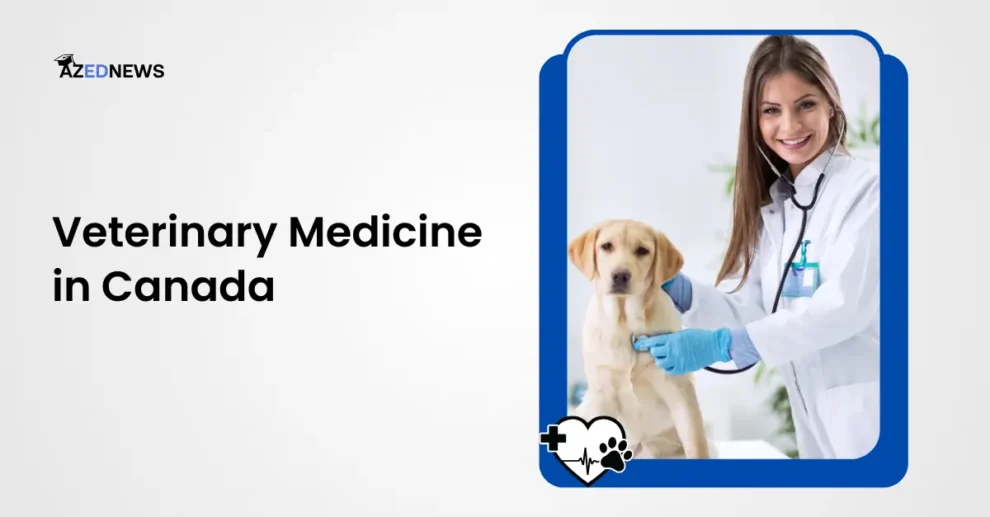Veterinary medicine in Canada deals with animals health. It is one of the popular streams among students in Canada. Vets help pets, horses, farm animals, and wild animals. They diagnose diseases and injuries. They treat and prevent them.
Table of Contents
To become a vet in Canada, you must study zoology or life sciences. Get a Bachelor’s degree. Then, get a Master’s degree or PhD. Vets can specialize in dentistry, parasitology, or physiotherapy.
After graduating, vets can do research. They can create new medicines and treatments for animals or they can work as vets. They are also called veterinary physicians.
Canadian vets have many career options. They can be marine biologists, science teachers, or park managers. They can work at zoos caring for animals. They can also be animal therapists or veterinary pathologists.
In this article, we will look at veterinary medicine in Canada. We will also learn who can apply, and how to get admitted in these courses. Let’s get started.
Key Takeaways
- Canada has many top universities for veterinary medicine.
- To get into vet school in Canada, you need good grades in math, biology, and science, and good English scores.
- You may also need to take the SAT or ACT.
- Vet school applications in Canada cost around $70-$130.
- Some of the top veterinary schools in Canada are the University of Saskatchewan, the University of Guelph, the University of Prince Edward Island, the University of Calgary, and the University of Montreal.
- Programs offered include Doctor of Veterinary Medicine (DVM), Master of Science (MSc), and Doctor of Philosophy (PhD) programs.
- Tuition fees vary between schools but can be around $12,717 per year.
- Scholarships are also available for international students.
Why Study Veterinary Medicine in Canada?
Canada is a top place for international students to study abroad. Canada has top Veterinary Universities that rank high in world university rankings for medical colleges. Here are some key reasons to choose a veterinary medicine course in Canada:
- Top-ranked universities: Canada has 18 top medical schools offering specialized degrees and in-depth knowledge.
- Growing job chances: Canada’s medical and health industry ranks third worldwide for high employment and growth. The country’s healthcare sector has seen steady yearly job growth over the past 5 years.
- Scholarship options: Canada provides many scholarships for international students to fund their education. Some top medical scholarships at any Canadian veterinary university include Achievers in Medical Science Graduate Recruitment, AE Bowie Scholarship in Medicine, Adiel Steacy Memorial Scholarships, University of Toronto Scholars Program, and more.
Eligibility Criteria for Veterinary Medicine in Canada
Getting into a veterinary school in Canada requires meeting certain rules. These rules change depending on the school and the program you want. There are three main groups of rules, and you must follow all of them to get into a top Canadian vet university. Here are the general rules to get into a vet school in Canada:
a. Educational qualifications
- To get into a bachelor’s degree or diploma course, you must finish 12th grade. Math and biology must be your subjects. You need at least 70% in your top 5 subjects.
- For a master’s program, you need a bachelor’s degree in a related field. Your degree must be from an accredited college. You need at least 75% marks or a B+ grade.
b. English language proficiency test scores
Students from other countries must show they know English well. They need to take tests like IELTS or TOEFL. Here are the minimum scores needed:
- For a diploma or bachelor’s degree program, the IELTS score is 7.0. For writing, it is 7.0 too. No section can be below 6.5.
- For a bachelor’s degree, the TOEFL score is 600 on the paper test. The writing section must be at least 6. For the internet test, it is 100 overall. Writing and speaking must be 25 or higher. Reading and listening must be 22 or higher.
- For a diploma or master’s degree, the IELTS writing score must be 7.0. No other section can be below 6.5.
- For a master’s degree, the TOEFL paper test score is 600. The writing section must be 6 or higher. For the internet test, it is 100 overall. Writing and speaking must be 25 or higher. Reading and listening must be 22 or higher.
c. Entrance test scores for Canada
Getting into a Canadian university requires taking certain tests. For undergrad programs, you may need to take the SAT or ACT. But for grad school or a master’s degree, you will need to take the GRE. The average minimum scores for vet med schools in Canada are:
- ACT score – 29 or above
- SAT score – at least 1350
- GRE score – around 300
Admission Process for Veterinary Medicine in Canada
Veterinary schools in Canada accept students twice a year. Here is how the admission process works:
- Visit the college website. Find their vet program. Check if you qualify.
- Fill out the online form. Upload transcripts, recommendations, essays, and finance papers.
- Pay the $70-130 application fee for vet medicine programs.
- Prepare documents for your Canadian student visa.
- Log in to check your application status on the portal.
- If accepted, the college emails you an offer letter.
- Pay tuition fees to confirm your spot.
- Follow the steps and pay fees to enroll.
- Once you get a study permit, visit campus to finalize your enrollment.
Top Colleges offering Veterinary Medicine courses in Canada
Here are some of the best colleges offering top-notch veterinary medicine courses in Canada. Let’s have a look at them:
1. Western College of Veterinary Medicine (WCVM)
The Western College of Veterinary Medicine (WCVM) is part of the University of Saskatchewan in Saskatoon. It offers degrees like DVM, M Sc, M VSC, and PhD. The college also provides diploma courses at the postgraduate level.
Veterinary medicine deals with studying diseases and animal health. Students learn basic and clinical sciences in caring for horses, farm animals, exotic pets, companion animals, and wildlife.
Programs Offered
- Doctor of Veterinary Medicine (DVM)
- Master of Science (MSc) – Clinical (Project) / Non-clinical (Thesis) – Large Animal Sciences
- Doctor of Philosophy (PhD) – Large Animal Sciences
- Master of Science (MSc) – Clinical/Non-clinical – Small Animal Sciences
- Doctor of Philosophy (PhD) – Small Animal Sciences
- Master of Science (MSc) – Veterinary Microbiology
- Master of Veterinary Science (MVetSc)
- Certificate in Veterinary Diagnostic Pathology (CVDP)
The tuition fee for the program is around $12,717, plus an additional $988 fee. This fee includes eye, health, and dental coverage, access to recreational activities, a fitness center, and a bus pass.
- Location: Saskatoon, Saskatchewan
2. Ontario Veterinary College (OVC) – Guelph
The University of Guelph has an Ontario Veterinary College. It offers veterinary programs recognized by Canadian and American veterinary groups.
The goal is to help people, animals, and nature stay healthy. Vets from this college learn about subjects like Chemistry, how the body works. They learn about tiny bugs, and animal bodies.
Programs Offered
- Doctor of Veterinary Medicine
- Associate Diploma in Veterinary Technology
- Veterinary Medicine/Public Health Program
For a bachelor’s degree, the tuition fee is around $75,774.85. Each semester costs about $38,342.17.
- Location: Guelph, Ontario
3. Atlantic Veterinary College (AVC) – University of Prince Edward Island
Veterinary programs at the Atlantic Veterinary College, University of Prince Edward Island, are fully accredited. The veterinary associations of both America and Canada recognize these programs.
The Royal College of Veterinary Surgeons in the UK also approves the programs. The university has a proven record of success in the North American Veterinary Licensing Examination.
Programs Offered
- Master of Science – Faculty of Veterinary Medicine
- Master of Veterinary Science
- PhD in Veterinary Medicine
- Doctor of Veterinary Medicine
For international students, the full-time graduate veterinary program costs around $7,548 per year. A master’s program costs approximately $8,688 for two years. The three-year PhD in Veterinary Medicine program costs around $13,023.
- Location: Charlottetown, Prince Edward Island
4. University of Calgary
The University of Calgary has a Faculty of Veterinary Medicine. This program trains students to become skilled animal doctors.
It includes hands-on learning about topics like helping animals heal, keeping horses healthy, keeping cattle healthy, stopping diseases from spreading, understanding how animals have babies, and caring for animals properly.
Programs Offered
- Veterinary Medical Sciences Graduate Program
- Doctor of Veterinary Medicine (DVM)
International students pay around $13,597.32 to study at the University of Calgary each year. This fee covers health insurance, being part of student groups, dental care, and donations.
- Location: Calgary, Alberta
5. University Of Montreal
The University of Montreal’s Faculty of Veterinary Medicine (FMV) is Canada’s only French-language veterinary school. It is one of Quebec’s biggest institutions and consistently ranks among the world’s top 100 universities.
FMV provides excellent education from great faculty members. Over 10,000 international students attend the University of Montreal yearly. While most university programs are in French, English speakers can apply for some graduate programs.
- PhD or Doctorate in Veterinary Medicine – Veterinary Sciences
- Graduate Diploma in Veterinary Medicine – Veterinary Pathology
- Short Graduate Program (Master’s Level) in Veterinary Medicine – Public Animal Health Interventions
- Residency Certificate in Advanced Internship in Applied Veterinary Sciences – Discipline-Specific
- Graduate Diploma in Veterinary Medicine – Veterinary Clinical Sciences
Tuition fees for University of Montreal programs range from CAD 19,892.28 to CAD 39,784.56 per year. Various merit-based scholarships are available for international students.
- Location: Saint-Hyacinthe, Quebec
Best Veterinary Medicine Courses in Canada
Here are some of the best veterinary medicine courses in Canada:
1. Master of Veterinary Science at the University of Prince Edward Island
The MVSc degree at the University of Prince Edward Island lasts two years. It is a non-thesis, professional Master’s program. It aims to improve the knowledge and skills of veterinarians.
The program focuses on one broad area: pathology, microbiology, or clinical sciences. The program provides advanced training in these disciplines. It also helps develop teaching and communication abilities.
After completing the program, a student can do an extra year of residency training. This makes them eligible for certification by specialty groups. These groups require three years of residency training.
To pass the program, a student must meet certain standards. They must get satisfactory grades in the required graduate courses. They must complete a research project. They must write a report suitable for publication in a journal.
- Duration: 2 Years
- Fees: CA$32,472
2. Ontario College Diploma in Veterinary Technician At Georgian College
The program at Georgian College gives students a chance to gain skills, knowledge, and attitudes to be part of a vet healthcare team.
Students explore what large animal practices, shelters, research facilities, zoos, and wildlife facilities do. They learn how to care for and handle animals. They understand basic normal and abnormal life processes. They also do routine lab and clinical tasks.
Typical tasks include getting and recording patient histories, collecting and testing lab samples, prepping patients, tools, and equipment for surgery, giving anesthesia and monitoring it, assisting with medical and surgery procedures. They get trained to provide specialized nursing care, taking diagnostic x-rays, and doing animal dentistry.
Graduates may find jobs as part of vet healthcare team, like working at vet hospitals, selling pharmaceuticals, working at diagnostic labs, research facilities, zoos, animal shelters, managing livestock health, or inspecting food animals.
- Duration: 2 Years
- Fees: CA$28,580
3. Diploma in Veterinary Technology At Douglas College
This two-year program at Douglas College trains students to become veterinary technicians. It provides theoretical and hands-on training in medical procedures, animal care, lab work, and communication skills.
Students learn nursing care for animals, anesthesia, anatomy, x-rays, dental care, nutrition, and medication handling. They gain practical experience with small and large animals on campus and at off-site facilities like clinics, stables, farms, and animal centers.
After graduating, students can take the Veterinary Technician National Exam (VTNE). Passing this exam allows them to register as a Registered Veterinary Technologist in Canada and parts of the US. All program graduates qualify for the Kristianson Veterinary Technology National Exam Bursary to cover the exam cost.
- Duration: 4 Semesters
4. Certificate in Veterinary Medical Assistant At Northern Alberta Institute of Technology
Veterinary medical assistants help veterinarians, animal health technologists, and clients. They handle tasks like administration, working with animals, and assisting with nutrition and medicine. They also maintain records and support clinical procedures.
This 1-year program at Northern Alberta Institute of Technology teaches skills to work as a veterinary medical assistant at vet clinics, livestock facilities, and animal shelters. You will learn in classrooms and gain hands-on experience at animal clinics across Alberta.
People interested should pay close attention to details. They should also handle fast pace and heavy workloads well. If you enjoy helping people with their pets, this program could suit you.
You must genuinely care about animals and their well-being. You will need to feel comfortable working with various animals, big and small.
After classroom instruction for a year, you will complete a clinical placement. This gives practical experience at an animal clinic, showing your potential future career. You may need to travel, as some placements occur outside Edmonton.
- Duration: 1 year
5. Ontario College Diploma in Veterinary Technician At Algonquin College
The two-year Veterinary Technician Ontario College Diploma program at Algonquin College prepares you to enter the Veterinary profession by offering an authentic learning experience in the local community.
You benefit from learning in the 10,100-square-foot Veterinary Learning Centre and Clinic. This facility includes a reception area, exam rooms, a husbandry area, a surgical suite, a dental suite, a radiography room, and more.
This facility is similar to a real-life small animal clinic. This enables you to have an on-campus learning experience using the equipment you would also use in the field. As a student, you have the unique opportunity to provide medical care to shelter animals and help prepare them for adoption.
While in the program, you become a vital member of the veterinary health care team, developing and acquiring valuable knowledge and skills that can then be applied to a variety of areas within the Veterinary Learning Centre and Clinic.
- Duration: 2 Years
6. Ontario College Diploma in Veterinary Technician At Seneca College
You will learn many things in this two-year program at Seneca College. It will help you assist vets, public health workers, and science researchers. You will study subjects like nutrition, finding diseases, tiny life, x-rays, animal body parts, how bodies work, and genes.
These subjects will teach you about animal behavior, and nursing care. The teachers are experts who work with students, graduates, and industry on research projects related to animals.
- Duration: 4 semesters
Frequently Asked Questions
1. How many years is veterinary medicine in Canada?
To become a vet, a student must first do two years of pre-vet university study or finish a college health science program. Then, they need to earn a four to five-year degree in veterinary medicine from a university. After that, they must pass a national exam to get certified. Finally, they require a license to practice in their province.
2. Is veterinary medicine in demand in Canada?
If you are not from Canada then you must get the right visa before starting work there. You can talk to the Immigration Department to know more. Canada needs many Veterinarians as there is a shortage of people with these skills.
3. How much does it cost to study veterinary medicine in Canada?
Studying for a veterinary medicine degree can be expensive. The cost for one year of the DVM program is around $14,500.00. This fee covers tuition and other general expenses.
4. Do veterinarians make a lot of money in Canada?
Many people work as Veterinarians in Canada. They take care of pets and animals. A Veterinarian in Canada makes around $115,962 per year. Veterinarians also get extra money. This extra money is called cash compensation. The cash compensation for a Veterinarian in Canada is about $13,553. The lowest amount of cash compensation is $5,914. The highest amount is $31,061.
Conclusion
Caring for pets and animals is an important job. Veterinarians help sick or hurt animals feel better. They give medicine and bandage wounds. They also plans meals to keep animals healthy. This work stops diseases from spreading from animals to people.
To be a vet in Canada, you must enroll yourself in veterinary medicine in Canada. You must pass an exam called NAVLE. After that, you must get a license for the province you want to work in. Vets earn between 56,000 and 101,000 Canadian dollars per year.
VCA Animal Hospital is a well known employer for vets in Canada. It pays around 84,871 dollars yearly. Getting a master’s degree can help you earn more money. If you will go for higher education it can lead to better job opportunities in Canada.












Add Comment